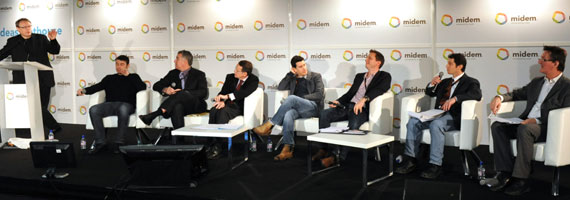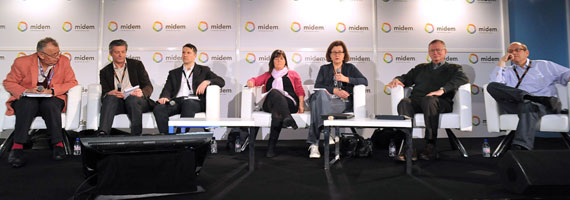
Belmont University professor Don Cusic reports exclusively for MusicRow from MIDEM in Cannes.
The final day at MIDEM (1/31) brought snow to the normally warm and sunny south of France. Inside the Palais was a series of morning seminars geared toward publishers.

(L-R) Emmanuel Legrand (moderator); Scott Bagby, Rdio; Richard Conlon, BMI; Thierry Desurmont, SACEM; Charlie Lexton, Merlin; Ben McEwen, PRS for Music; Mitch Rubin, Nokia; Jens-Markus Wegener, AMV Talpa
The morning began with a seminar titled “The Cloud—Is It Just a Licensing Issue?” On the panel were Scott Bagby, with RDIO (UK); Richard Conlon, SVP with BMI (USA); Thierry Desurmont, with SACEM (France); Charlie Lexton with Merlin (UK); Ben McEwen with PRS for Music (UK); Mitch Rubin with Nokia; and Jens Markus Wegener with AMV Talpa (Germany). The moderator was Emmanuiel Legrand, an independent journalist from UK.
At the end of the seminar, Lexton said, “Our job is to turn the cloud into a licensing issue and make it easy to license.”
The general consensus for how the cloud, or more accurately “clouds” since they are individual, will influence the next generation of the music industry includes how to license and compensate content. There is concern that the cloud is a laundromat for illegal files and no regulations exist to keep these illegal files out of the cloud.
Bagby said the essential problem is the struggle between record labels and publishers. “We should be one big family,” he explained, “but there’s a lot of people to make happy and that gets complicated, so labels and publishers blame each other.”
Both sides of the technology industry wished there was one place to get rights cleared. Rubin said, “You don’t buy a car, then buy the engine and then the seats. We don’t care how the payment gets dished out but the current system makes it inherently difficult to negotiate for one right with many rights holders.”
Conlon noted, “Silicon Valley thinks we’re nuts but we’re trying to manage velocity and the speed of innovation.”

"Towards the Global Repertoire Database" panel. (L-R) Steven Navin, Music Publishers Association; Michel Allain, SACEM; Jez Bell, Omnifone; Karen Buse, PRS for Music; Jane Dyball, Warner Chappell Music; Ralph Peer II, peermusic; Sami Valkonen, Android/Google
Another session, “Towards the Global Repertoire Database (GRD),” featured panelists Michel Allain with SACEM (France), Jex Bell with Omnifone (UK), Karen Buse with PRS for Music (UK), Jane Dyball Warner Chappell (UK), Ralph Peer II with peermusic (USA) and Sami Valkonen with Google (USA), and moderator Stephen Navin with MPA (UK). Valkonen noted, “The world is moving towards a repertoire based database. Today there are different databases in different countries, which is hugely ineffective.”
Peer mentioned the effort to institute a GDB has been going on for several years. “The strength of the GRD is that it levels the playing fields for all rights involved,” he said. “We spend enormous amounts of resources checking databases around the world. This would create a single accurate database to help small publishers and composers get their money faster. An inherent weakness is that it’s always going to be a work in progress, there will be new material to be logged. We need to get data in immediately and that will be challenging when a hot new song comes from a hot new artist and there’s a lot of revenue generated quickly.”
Valkonen (Google) noted, “The real threat to GRD is that we started in 2008 and it is now 2012 and we’re still in a scoping study. This could be a carousel that keeps going ’round.”
Dyball (Warner Chappell) said, “With a GRD, songwriters will only have to look one place to make sure everything is correct. We waste a lot of time checking registrations around the world. Counter-claims always come up and we need to direct people into creative revenue generating activities because that’s how we will grow our business.”
All panelists agreed that the project must go forward, and Bell (UK) said, “If nothing goes through, there will be more pain in administration and songwriters will not be paid quickly and effectively.”
In the final seminar, “Measuring the Impact of Music Marketing Campaigns,” Sarah Lewin, editor of Sandbox, answered how exactly to measure music campaigns, “Establish clear objectives or goals.” This includes everything from money earned to names added to an email list.
Lewin summarized effective marketing as: (1) keep it simple, (2) set a budget, (3) work towards viral-ity on the internet, (4) think about your audience and (5) copy and adapt other successful campaigns.

Category: Artist, Exclusive, Featured, Organizations, Publishing
About the Author
Don Cusic is Professor of Music Business at Belmont University. He has authored 18 books, including his most recent “Discovering Country Music.”View Author Profile


